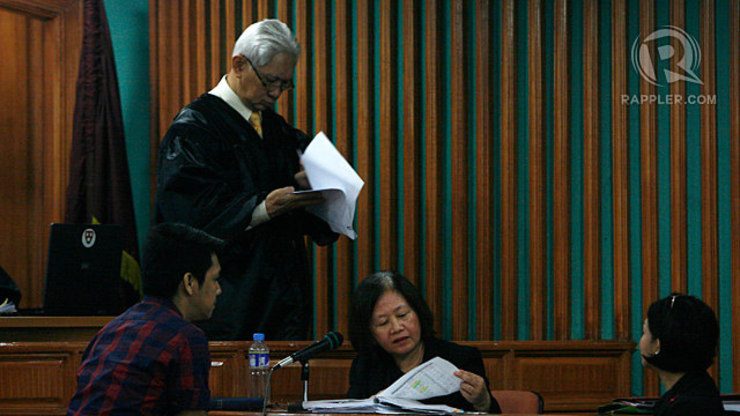SUMMARY
This is AI generated summarization, which may have errors. For context, always refer to the full article.

'Graft and corruption will continue in the country as long as the laws being implemented remain unclear,' says Sandiganbayan Justice Samuel Martires, citing an 'unclear' provision in the state's procurement law
MANILA, Philippines – Anti-graft court Sandiganbayan Justice Samuel Martires believes the country’s laws governing government transactions with the private sector need more clarity.
At the bail hearing of alleged big-time scammer Janet Lim-Napoles before the court’s 3rd division on Friday, August 8, Martires expressed dismay over what he called an “unclear” provision in the Government Procurement Reform Act (GPRA) that defined the items covered by the law.
“Graft and corruption will continue in the country as long as the laws being implemented remain unclear,” he said.
Martires’ comment was triggered by portions of a GPRA provision read by prosecution witness and Commission on Audit (COA) Assistant Commissioner Susan Garcia that defined the following items: infrastructure projects, goods, and consulting services.
Garcia read the GPRA provision after Martires questioned if non-governmental organizations (NGOs) contracting with state firms to implement projects funded by the Priority Development Assistance Fund (PDAF) are covered by the procurement law.
Garcia said the GPRA applies to transactions of NGOs with government.
Garcia was made to testify on COA’s special audit report on the use of lawmakers’ PDAF from years 2007 to 2009, which noted several irregularities.
The COA official explained in court that the transactions of Napoles-controlled NGOs violated procurement rules as they did not go through a bidding process. (READ: COA witness: Napoles NGOs broke all rules)
The Sandiganbayan’s 3rd division is hearing the plea for bail of Napoles.
Napoles is charged with plunder and graft for allegedly defrauding the government millions of PDAF by using dummy NGOs to fake the implementation of livelihood projects in poor rural communities. She allegedly did this in connivance with public officials and employees, including 3 senators – Juan Ponce Enrile, Jinggoy Estrada, and Ramon “Bong” Revilla Jr – now in jail pending their plunder and graft cases.
Are NGOs covered by the procurement law?
Garcia cited state firms that transacted with Napoles NGOs, among them, the National Agri-Business Corporation (Nabcor), the National Livelihood Development Corporation (NLDC), and the Technology Resource Center (TRC).
In a petition before the Supreme Court filed Thursday, August 7, former Nabcor president Allan Javellana argued that the agreements entered into by Nabcor and the subject NGOs are not procurement contracts.
“In the cases at bar, the choice of the NGO did not involve the procurement of the services of the NGO. As a matter of fact, nothing in the Memorandum of Agreement (MOA) subject of these cases showed that the NGO was compensated for its work under the MOA,” his petition read.
It read further: “Neither did it show that it was the intention of the parties to procure the services of the NGO. Instead, it was clear that the NGO is intended to be a partner in the endeavor. Accordingly, the GPRA does not apply.”
Javellana is charged with a total of 6 counts of graft, two for each of the 3 Sandiganbayan divisions handling the PDAF scam cases.
Garcia told the Sandiganbayan’s 3rd division that Nabcor, NLDC, and TRC all entered into contracts with the Napoles NGOs for agricultural livelihood projects funded by Enrile’s PDAF.
NGOs transacting w/ gov’t considered ‘goods’
The GPRA provides a streamlined procurement process and a system of accountability for both the public and the private sector.
Within the GPRA’s scope are infrastructure projects, goods, and consulting services.
Garcia explained to the court that NGOs contracted by state firms are considered goods, because all other items – except “infrastructure projects” and “consulting services” – fall under the said category.
“That is the definition of the DBM (Department of Budget and Management). ‘All other’ [are] goods, even janitorial services,” she told the court, upon Martires’ questioning.
Napoles’ lead counsel Stephen David stood up, however, to say that what Garcia explained was “just her personal interpretation and personal appreciation” of a resolution issued by the Government Procurement and Policy Board (GPPB).
Martires told David to sit down and to instead prove his point during his own cross-examination of the witness.
The GPRA defines goods as “all items, supplies, materials and general support services, except consulting services and infrastructure projects, which may be needed in the transaction of the public businesses or in the pursuit of any government undertaking, project or activity, whether in the nature of equipment, furniture, stationery, materials for construction, or personal property of any kind, including non-personal or contractual services such as the repair and maintenance of equipment and furniture, as well as trucking, hauling, janitorial, security, and related or analogous services, as well as procurement of materials and supplies provided by the procuring entity or such services.” – Rappler.com
Add a comment
How does this make you feel?
Loading
There are no comments yet. Add your comment to start the conversation.